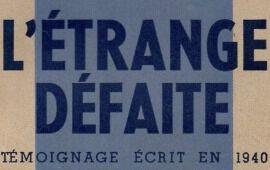In times of war, for a nation to be truly victorious, it must believe in itself and its moral standing. It must have pride and confidence in its history, something that binds its people together. That national history, in turn, helps provide a vision of its destiny.
Our website is dedicated to history and archaeology—specifically, biblical history and archaeology—something that in large part relates to the history of Israel. We examine archaeological evidence relating to the historicity of the biblical account. We take a positive view of Bible historicity, agreeing with Sir Winston Churchill that the evidence at hand “fortif[ies] the grand simplicity and essential accuracy of the recorded truths which have lighted so far the pilgrimage of man” (Thoughts and Adventures, “Moses: The Leader of a People”).
We agree with the renowned 20th-century archaeologist Prof. Nelson Glueck, who wrote, “It may be stated categorically that no archaeological discovery has ever controverted a biblical reference. Scores of archaeological findings have been made which confirm in clear outline or exact detail historical statements in the Bible” (Rivers in the Desert: A History of the Negev; see here, here and here for some examples of supposed contradiction). We agree with his contemporary Prof. William Foxwell Albright, who wrote, “There can be no doubt that archaeology has confirmed the substantial historicity of Old Testament tradition” (Archaeology and the Religions of Israel). He also wrote, “Discovery after discovery has established the accuracy of innumerable details of the Bible as a source of history” (The Archaeology of Palestine).
Naturally, such a positive position on Bible historicity is not ubiquitous. There are numerous differing opinions on the accuracy and correct interpretation of the biblical account in scholarship. But it goes without saying that the question of the faithfulness in which the biblical text has been relayed to us is no moot matter. The Hebrew Bible, or Old Testament, is dear to the hearts of millions of Israelis and Jews, as well as billions of believers worldwide: to Christians, who believe that “the Jews were entrusted with the oracles of God” (Romans 3:2; English Standard Version); to Muslims also, whose Qur’an repeatedly asserts that Allah “did reveal the Torah, wherein is guidance and a light” (Al-Ma’idah 5:44; Pickthall translation); and to numerous others of various religious persuasions besides.
Amid the horrifying events of the past two months, much of the online debate about biblical historicity appears to have gone comparatively quiet. Perhaps not surprisingly. Nobody has an appetite for such content at a time of national desperation. Now is the time for heroes and heroism, not for—as the great wartime leader Churchill said—the speculative and sapping “tomes” of “Dr. Dryasdust” and “Professor Gradgrind.” “We reject, however, with scorn all [their] learned and labored myths that Moses was but a legendary figure,” wrote Churchill.
Now is a time for anchoring to, and drawing from, the bedrock of heroes and their lessons of old—lessons that mere negative testimony cannot do away with. (As Prof. George Frederick Wright wrote in 1910, following the about-face in scholarship after the discovery of the Hittite Empire: “When shall we learn the inconclusiveness of negative testimony?”) Dismissiveness is a luxury afforded only by peacetime.
During such a time of national calamity, and in light of this study of history and academia, lessons from 1940 France come to mind.

